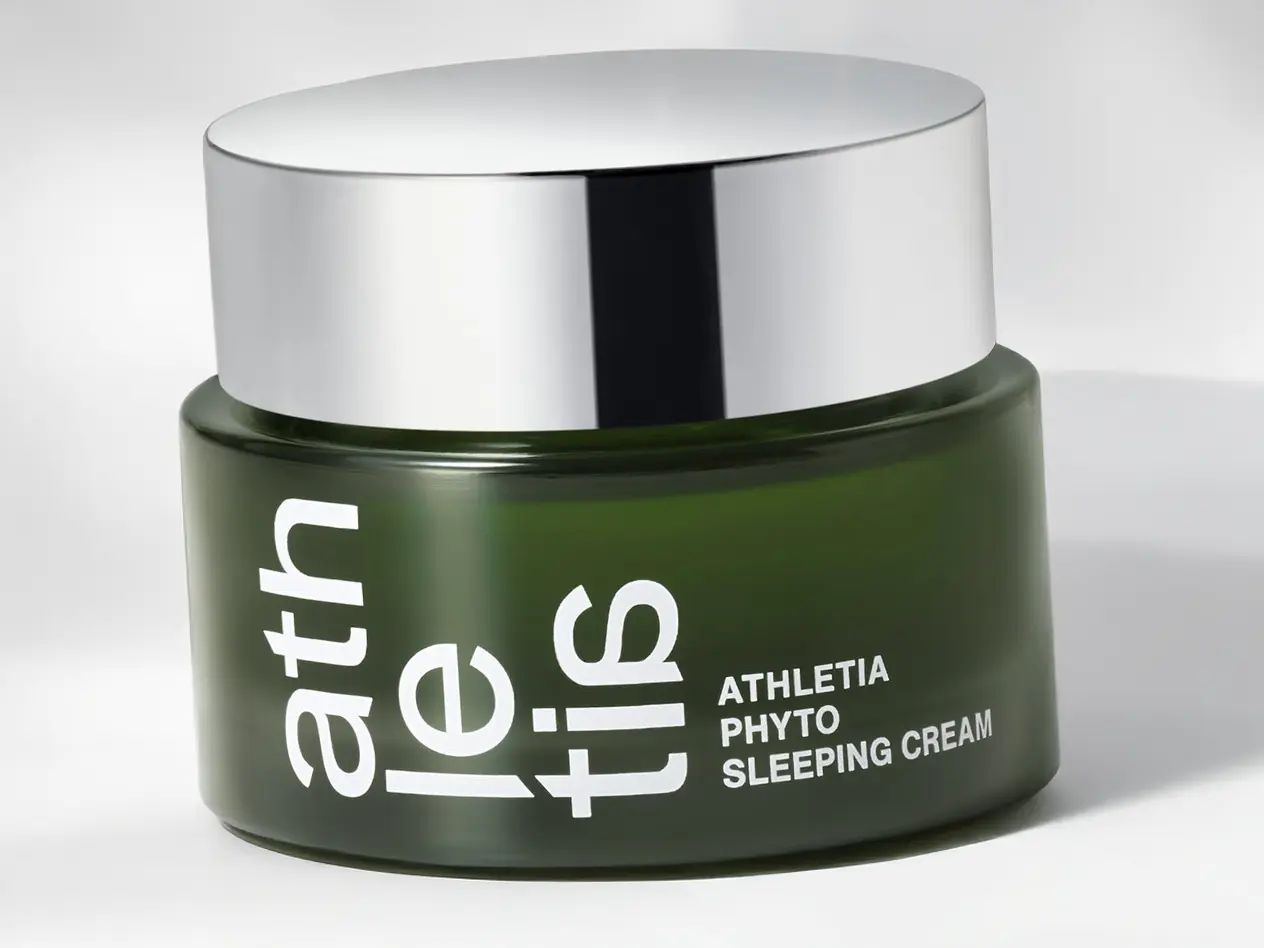Athletia Beauty may have slipped past some casual beauty browsers, but the brand has a reputation among skincare diehards for quiet craft and a focus on sensorial formulas that respect skin.
The brand pitches their flagship night cream as a rich hydrator that eases dehydration, leaning on plant-derived ingredients to help you wake to more supple skin.
I spent a full two weeks using it nightly to see how well it performs in real life, and whether it earns a spot in a routine that respects both skin and budget.
What Is Phyto Sleeping Cream?
Phyto Sleeping Cream is an overnight treatment from athletia. Overnight treatments are products you apply before bed so they can work while you sleep, when skin naturally repairs itself. They usually focus on replenishing moisture and supporting the skin barrier so you wake up with skin that feels less tight and looks more supple.
This formula aims to relieve dehydration with a blend of plant-derived ingredients, including geranium robertianum extract plus three seed oils. It has a soft lavender and cedarwood scent that leans calming at night. The texture is rich enough to create a comfortable layer that helps reduce water loss until morning.
Use it as the last step in your evening routine. Take a dime-sized amount, warm it between your hands, then press and wrap it into the face so it blends evenly.
Did It Work?
I stopped my usual overnight treatment for a few days to give this a fair shot, which felt very scientific of me I must say! Two weeks feels like a reasonable window to judge an overnight cream, so I used it nightly as the last step and followed the press and wrap method.
I started with the recommended pearl sized amount, warmed it between my palms, then pressed it over a hydrating serum most nights. On four nights I used it on bare skin to see how it performed solo. The first three nights brought instant comfort. The texture melted in after a minute and left a cushioned feel without a greasy slip. The lavender and cedarwood read quiet and helped me wind down. I woke to skin that felt softer with fine dehydration lines around my cheeks looking less cranky. No tingling or redness, though my T-zone looked extra dewy by morning.
By the middle stretch, nights four through nine, the cream reliably kept tightness at bay and held moisture until morning. Flakiness around the nostrils diminished, and my skin felt less reactive to a retinoid I used earlier in the evening on two occasions.
In the final days, results leveled off in a steady way. My skin looked consistently supple and felt smooth to the touch. No dramatic brightening, just a rested look and better makeup glide over dry patches. It never pilled over serums, and the scent stayed soft, though if you are sensitive to fragrance it could feel a touch present right after application.
So did it work? Yes, it delivered on relieving dehydration and giving me comfortably plump morning skin. Would I add it to my personal collection? Not quite, since I can get similar results from options that are lighter on scent and fit my routine better. Still, if you crave a soothing night cream that cocoons without feeling heavy, this is a lovely way to end the day.
Phyto Sleeping Cream’s Main Ingredients Explained
This formula leans on a classic mix of humectants, emollients, and barrier helpers to keep water in and irritation down by morning. Glycerin, propanediol, and butylene glycol pull moisture into the skin, which is why the cream feels cushy without a wet slip. Squalane softens and fortifies with a light touch while olive, sweet almond, grape seed, and evening primrose oils add occlusion and fatty acids that slow overnight water loss. Hydrogenated lecithin and cholesterol help mimic skin’s own lipid matrix, and together with behenyl and cetearyl alcohol they create that smooth, sealing finish that kept tightness at bay in testing.
Rice ferment filtrate acts like a skin-conditioning ferment that can support a healthier looking barrier and a more even feel over time. The plant extracts are chosen more for comfort than drama. Geranium robertianum, perilla leaf, and angelica keiskei bring antioxidant and soothing benefits that pair well with nightly use, especially if your routine includes actives like retinoids earlier in the evening.
On the scent side, lavender and cedarwood are present alongside parfum with listed fragrance allergens like linalool, limonene, hexyl cinnamal, and coumarin. These are common in perfumed skincare and can bother very reactive skin, especially if they oxidize over time. If you are sensitive to fragrance you may want to patch test or keep use to a few nights a week.
For acne prone readers, several emollients here are considered low to moderate on the comedogenic scale. Olive oil and sweet almond oil can be mildly comedogenic for some, grape seed and evening primrose are generally lower risk, and squalane is widely seen as non comedogenic. Comedogenic means an ingredient has a tendency to clog pores and contribute to bumps like closed comedones, though the overall formula, concentration, and your skin type matter more than any single rating. Adjusting the amount to a smaller pea can reduce the risk if you notice extra congestion.
Vegan or vegetarian suitability is not fully clear. Cholesterol is included and is often derived from animal sources, though it can be synthetic or plant sourced. Without explicit confirmation from athletia, I would not call this vegan. It may suit some vegetarians depending on personal stance, so check with the brand for source details if this is important to you.
Regarding pregnancy, there are no obvious red flag actives like retinoids or strong exfoliating acids. Still, the formula contains fragrance and essential oil components, and every pregnancy is different. Out of caution, avoid new topicals unless your healthcare provider gives specific approval.
Other callouts worth noting: phenoxyethanol serves as a preservative, disodium EDTA helps stabilize, and potassium hydroxide adjusts pH. There is no drying alcohol listed. Overall the blend prioritizes barrier support and moisture retention, which explains the consistently supple mornings reported in testing.
What I Liked/Didn’t Like
Here is the quick take after two weeks of nightly use.
What Works Well:
- Consistently relieves dehydration so skin feels cushioned and looks more supple by morning
- Plays nicely over serums with no pilling and helped temper retinoid dryness on test nights
- Rich texture that absorbs without a greasy slip when you stick to a small amount
- Generous 30g tub
What to Consider:
- Contains parfum and fragrance allergens which may not suit very sensitive skin
- Can feel a bit occlusive in humid weather and may encourage minor congestion on combo or oily skin unless you use less
- Quite expensive
My Final Thoughts
A good overnight treatment is the difference between playing defense and actually waking up ahead. After two weeks of steady use and with plenty of experience testing similar creams, I feel I gave Phyto Sleeping Cream a fair shot. It lives up to the brand’s bedtime story in spirit, if not quite in spectacle. The moisture cushion is real, the morning suppleness is consistent, and the scent aims to tuck you in with a wink. For me it earns a solid 7.5/10.
Who is it for? Dry to normal skin that leans dehydrated, anyone pairing retinoids who needs a comforting topcoat, and those who enjoy a gentle lavender and cedarwood vibe at night. Who should skip it? Very fragrance sensitive skin, oilier types in humid climates, and anyone who prefers ultra bare formulas. Was I impressed? Yes on texture, comfort and barrier support, less so on value given the scent load and the fact that results were steady rather than standout. Would I recommend it to a friend? I would, with the caveat to start with a small pea, especially if you run combination or acne prone.
If you want alternatives I have used and rate, Deascal’s Nocturnal Revive Cream is an excellent allrounder one-and-done night cream that covers all bases, suits all skin types and has a great price point for how effective it is. For a cushy but fragrance free option, CeraVe PM Facial Lotion is reliable, lightweight and plays well with actives. Stratia Night Shift brings ceramides, niacinamide and a balanced finish that supports the barrier without heaviness. If you like a richer feel, Rhode Barrier Butter gives a dewy seal that calms dryness fast.
Before you dive in, consider your fragrance tolerance, climate, and how many occlusives your routine already includes. Patch test first on the jawline or behind the ear for a few nights, and forgive me for sounding like an over protective parent. Finally, results are not permanent and need consistent use to maintain, as obvious as that may be.

